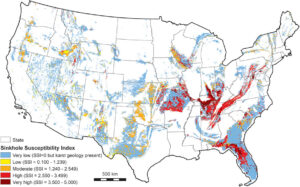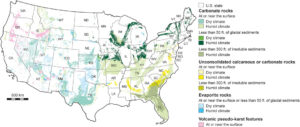
Nashville sits on limestone.
This geology creates unique challenges for the city, and it is often neglected — or misunderstood — in conversations about development and climate change.
Take the latest controversy: Elon Musk’s Boring Company is planning to build a tunnel for Teslas between downtown Nashville and the airport. The project raises concerns with residents and experts who worry that the tunnel could increase risks for sinkholes or disrupt the underground flow of water.
“If my house sinks one day…” Robert Davidson, a board member of the city’s Convention Center Authority, began to say during a meeting with the Boring Company last week.
The company’s vice president, David Buss, cut in. He referred to Nashville’s rock as “hard,” suggesting that it would translate to “hopefully very little settlement” during construction.
But limestone is, actually, pretty soft.
Nashville’s limestone terrain is vulnerable to sinkholes
Nearly 500 million years ago, in the Ordovician period, a shallow ocean covered Nashville. Marine animal shells, composed of calcium carbonate, collected on the ocean floor and began forming limestone.
Limestone starts at 3 on the Mohs scale, which is how geologists measure hardness. One is soft, 2.5 is a fingernail, and 10 is a diamond.
“It’s not hard,” said Molly Miller, professor emeritus of geology at Vanderbilt University. “What makes it tricky is that it is sort of like Swiss cheese.”
Limestone dissolves, just like salt dissolves in water, creating a terrain full of cracks and holes. This underground landscape is known as karst, and it makes the city prone to geological hazards.
Nashville is even considered a sinkhole hotspot, according to research published by U.S. Geological Survey scientists in Frontiers in 2023.
 Courtesy U.S. Geological Survey
Courtesy U.S. Geological Survey Researchers at the U.S. Geological Survey found that sinkhole risks exist under downtown Nashville.
Sinkholes form in limestone slowly when water and sediments gradually dribble downward or rapidly when a cave, formed when horizontal cracks enlarge, collapses from the weight of the overlying earth.
The area between downtown and the airport contains limestone and calcarenite, a type of limestone with sand-sized carbonate grains, which is particularly vulnerable to tunnel work.
Local research on this limestone is limited. Tennessee is a geological desert, Miller said, with most state mapping efforts dating back at least 50 years.
“It’s not like the rocks have had MRIs of their stomachs, so we don’t really know what’s underneath there,” Miller said.
Tunneling in karst requires ‘disaster planning and prevention’
There have been studies on tunneling through karst in other parts of the world, like China, Iran and Germany. Researchers unanimously urge caution, given the unpredictability of the fractured rock and how water flows through and around it.
Constructing tunnels in carbonate karstic rocks “has always been the most hazardous and problematic task in civil and mining engineering,” researchers wrote in a 2012 study published in the Arabian Journal of Geosciences. Studies as recently as last year advise careful planning for “disaster prediction and prevention.”
In addition to and intersecting with sinkhole risks, tunneling in karst will impact the local water system, potentially affecting runoff and underground water movement with long-term consequences and more immediate concerns, like flooding.
Nashville often dances between drought and heavy rain, which can shift the ground enough to break water pipes. In 2021, Tennessee set a daily rainfall record for a non-coastal state when 20 inches of rain fell near Waverly. A similar rainfall event could happen in Nashville, and risks for such extreme weather are increasing as the climate warms from fossil fuel pollution, deforestation and industries like animal agriculture.
The Boring Company’s founder, Elon Musk, has suggested, broadly, that he favors a regulatory environment that issues fines if plans go awry as opposed to government environmental reviews before projects.
The Boring Company did not respond to interview requests about how it would approach safety, given Nashville’s geology.


